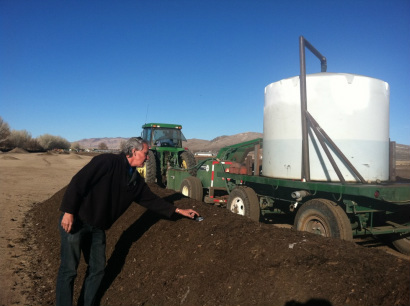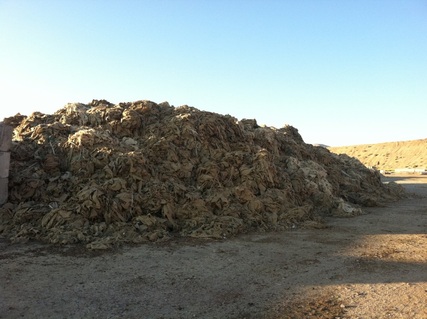
I've interviewed local compost experts for an article in Edible Reno-Tahoe, got wind of the dirty business of Waste Management Inc., spoke at a town council meeting opposing the the rezoning of agricultural land to light-industrial and most recently, attended a one-day workshop to learn more about subscription farming for small farms, aka community supported agriculture (CSA). Here are a couple of those stories...

For the magazine article, I interviewed two fascinating characters. Each own and operate their own regional, composting facility in Northern Nevada. With every master composter I meet, one thing is clear...they intoxicate others with their knowledge. Soil is their caffeine driving them to share the secret they hold, that compost can transform our depleted soils naturally. They understand the innumerable ecological benefits that compost can have not only on our soil but the environment. They root tirelessly in hopes that their theories become accepted and embraced by the mainstream. With my affinity for the stuff and aspirations to understand as much as I can, I'm like a disciple in their presence; listening to every word like a child hinged on the tale of a bedtime story. See Craig' vermicomposting video at the bottom of this post.
Craig Witt of Full Circle Compost in Minden has been composting professionally for over 20-years and farming since he was old enough to walk. He is the Joel Salatin of Soil. Energetic and evangelic in his passion for soil's biology. We easily blew six hours one afternoon talking about compost recipes, books on the subject, philosophies and more. When I left, he loaded me up with his homemade jalapeno jelly and zucchini relish. Yum! His composting site is located at the Carson City Correctional Facility where inmates on good behavior learn the trade and basically run the compost operation. I was equally impressed with the prison itself. I had never been to one before. As we checked in at the guard house, a prisoner who was in the yard just outside the building, came up to a drive-thru type window asking the guard about the "big dude" who had arrived the day before with seven others. Eegh! It was quite exciting.

Tom Donovan with RT Donovan Landscape in Sparks on the other hand has only been composting for 2-years. Tom carries a Clint Eastwood-cowboy quality and speaks with a subtle, western drawl. His no-nonsense approach to composting wrangles all my loose-ends on the subject. He speaks compost in terms that a layman can understand and I appreciate.
In an effort to diversify their family's 50-year old sand and gravel company, they repurposed a portion of their property for collections and composting of organic material. Sand & gravel was a multi-million dollar business for RTD but it has whittled down significantly over the past few years due to the housing crash. Composting is proving to be promising business.
SUBSCRIPTION DRIVE
As I entered the conference room on the Western Nevada College campus in Fallon, I was delighted to see a packed room of 65-participants for the CSA workshop. Only a handful currently ran a CSA meaning the majority where there to learn the basic steps to incorporate a subscription program into their farming business. Phenomenal!! More farmers!
A subscription program, or CSA, is where people pay a farmer up-front for food grown and in return, receive a box of veggies every week from Spring to Fall. CSA's are happening all across the United States. They are the easiest way to become better connected to where our food comes from while at the same time giving farmers a fair price for their hard work but cutting out the middleman.
All the speakers were fantastic but Wendy Baroli with Girl Farm really sent people home with something to think about. Unscripted, she commanded the room with a presentation from the heart. Whether one implemented her alternative CSA model or not, she provided excellent take-away's for everyone; namely, know your customer! Her customers are working owners meaning they are not just members and they are more than volunteers. Each pay $2500/year for 14-months to be part owner in Girl Farm. In return, they get loads of vegetables plus eggs, lamb, pork, chicken and turkey. As owners, they are required to work one day every two weeks. It may seem like a lot of time and money but it would cost a lot more to own your own farm. As Wendy puts it, "You don't have to own you own farm, you can get together with your neighbors and own a farm together." That is in essence what they are doing. In its purest form, a CSA member shares in the risk with his/her farmer. But until you are part owner, is that risk tangible. Their co-owners are invested!

 RSS Feed
RSS Feed
